How to make your own Heating bed to aid Yamadori survival
+8
Jay Gaydosh
flor1
landerloos
Rob Kempinski
Pavel Slovák
Kev Bailey
Mario Stefano
Smithy
12 posters
Page 1 of 1
 How to make your own Heating bed to aid Yamadori survival
How to make your own Heating bed to aid Yamadori survival
I have used a heating bed for over ten years as the best way to increase the recovery of collected yamadori... giving me a success rate of over 95%. The building of my new Greenhouse meant that I could have a new much larger heating bed. This is how I made it.
The whole frame is 12ft x 3ft The Timber was 9”x 2”. There is NO base to the frame, it is laid directly on the stone flags. The Timber is held together with 6” galvanized bolts

A layer of silver backed ‘bubble’ insulation is laid directly on the floor. I could have used 1” Polystyrene block, but this proved OK.

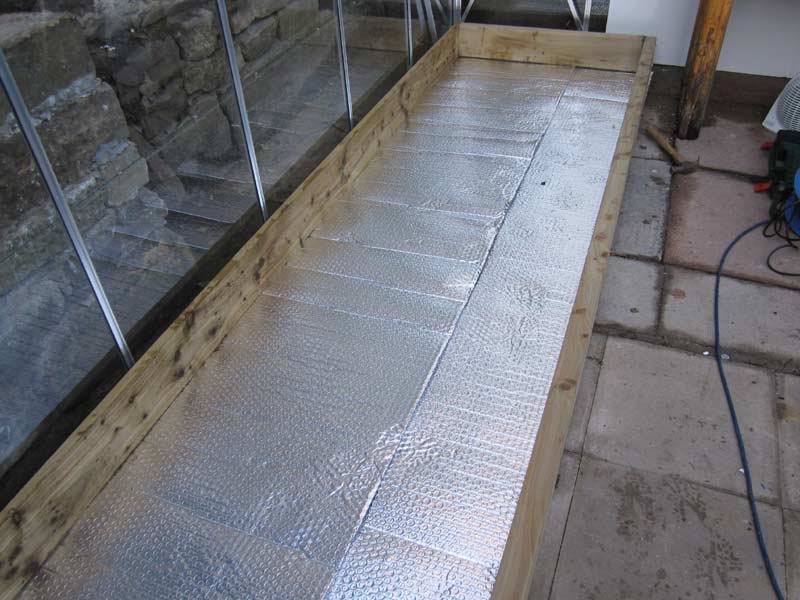
To ensure that the moisture is retained the whole frame is lined with a Heavy Duty Polythene Sheet, and ‘stapled’ into position, particular attention is given to the corners. Holes are cut into the edges to afford drainage as the bed would fill with water and this is not desirable.
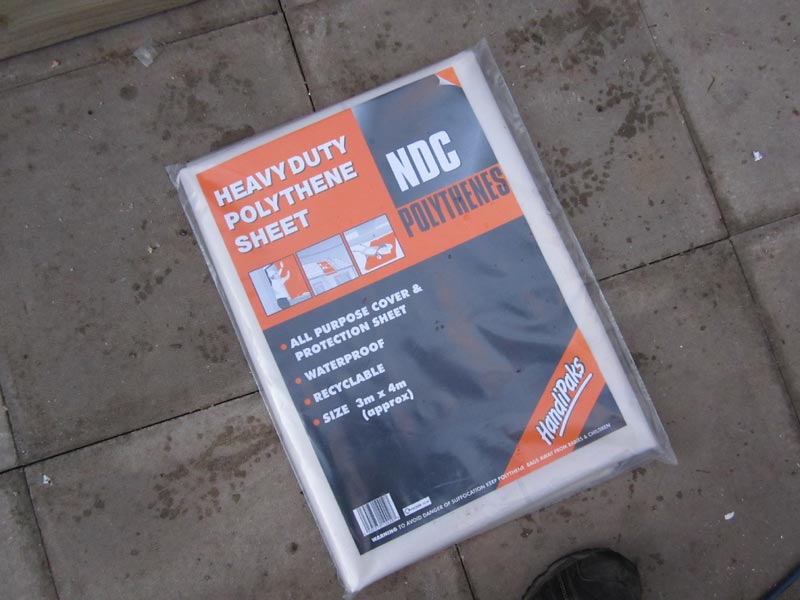
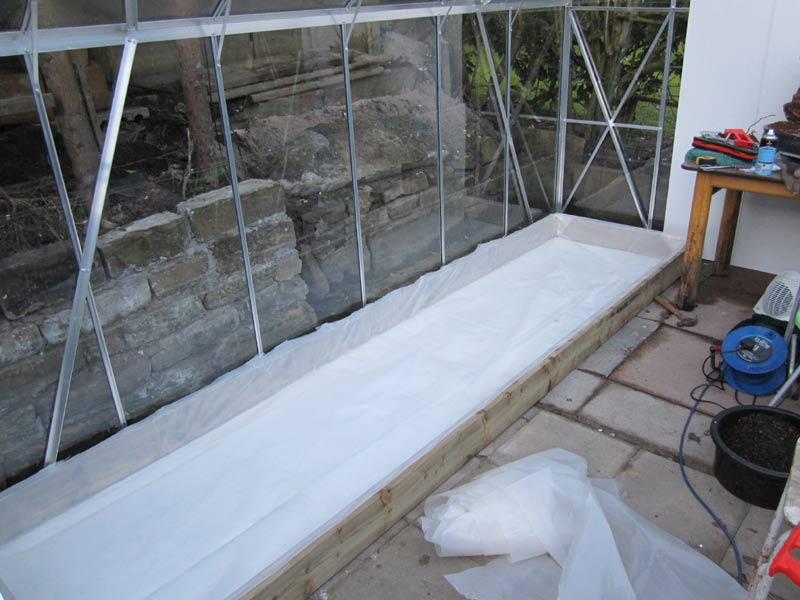
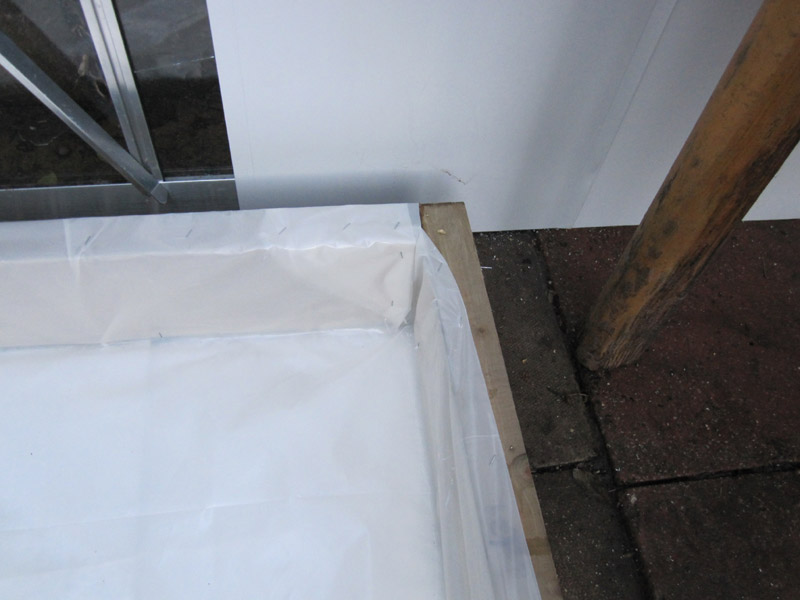
Batons are screwed into the top of the frame to secure the Polythene Sheet, galvanised screws are used.

12 bags of Kiln Dried Sand are used to line the base of the frame, 2” deep. This Sand never ‘hardens’ and is a joy to work with. ‘Builders’ sand is not suitable. The Sand is then saturated with water
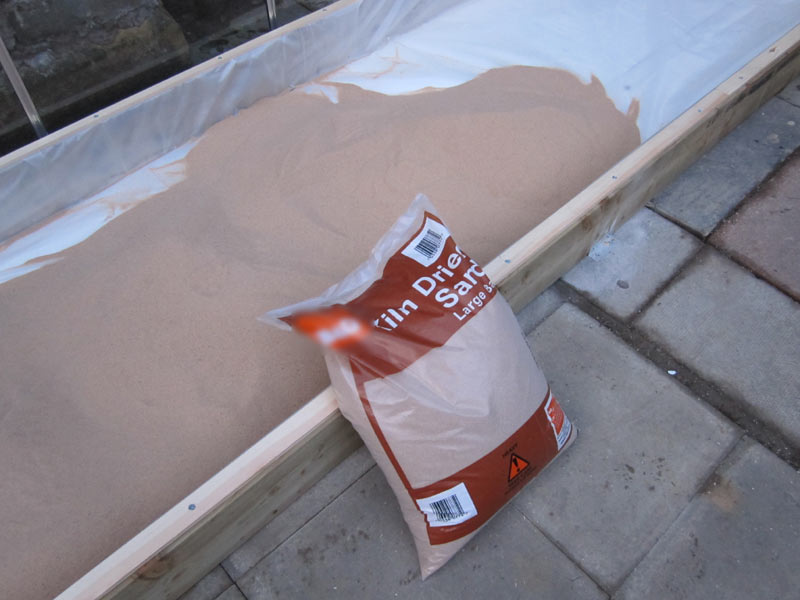
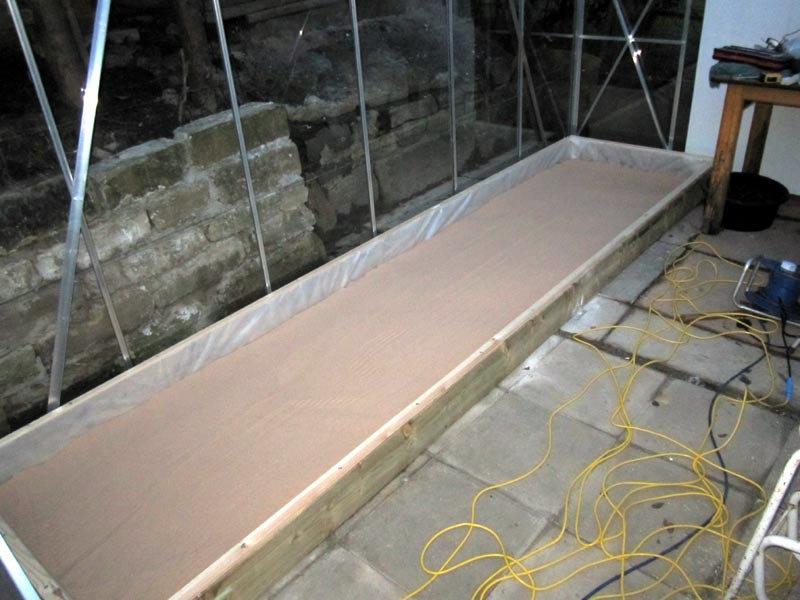
The heating cable (80ft long) is placed as shown and covered with a further 2” of Sand. The heating cable is unwound and plugged in. This is to 'soften' the cable as it is very stiff when cold.

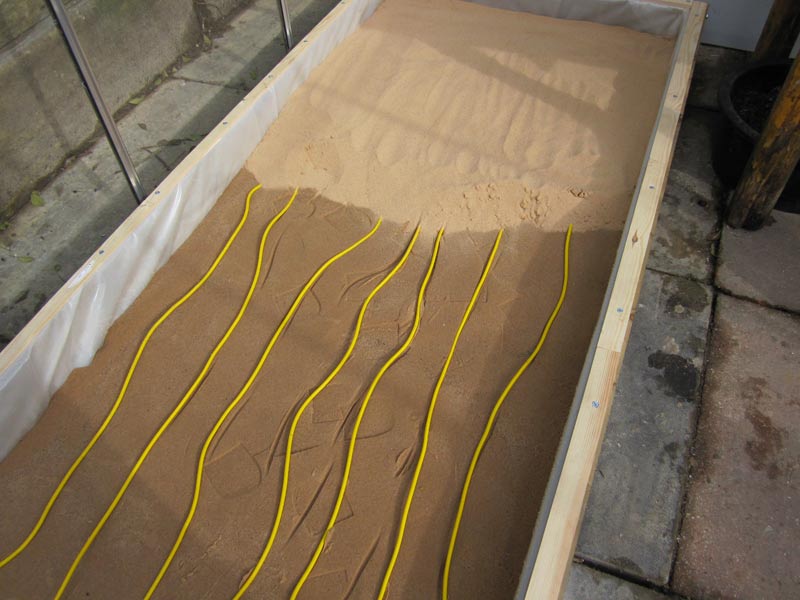
The completed Heating Bed, the cable is secured to the frame with a cable clip and the whole bed is saturated with water.
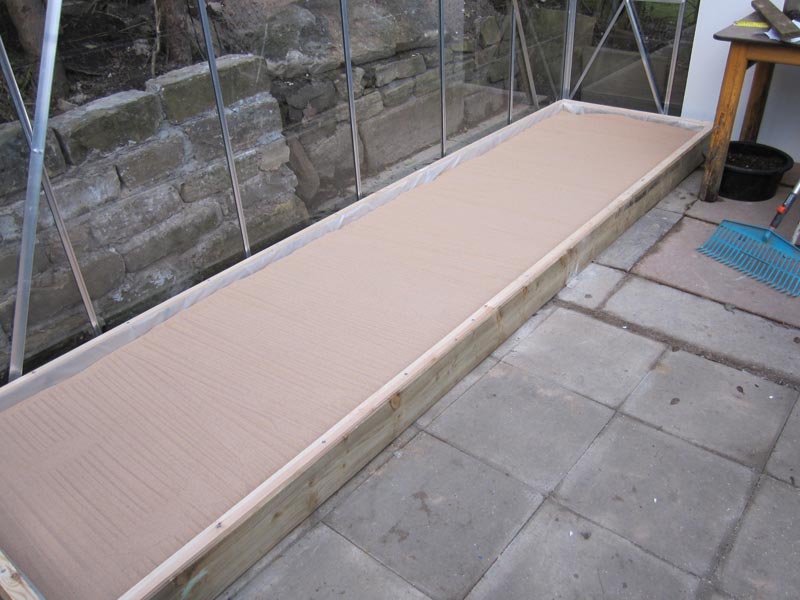
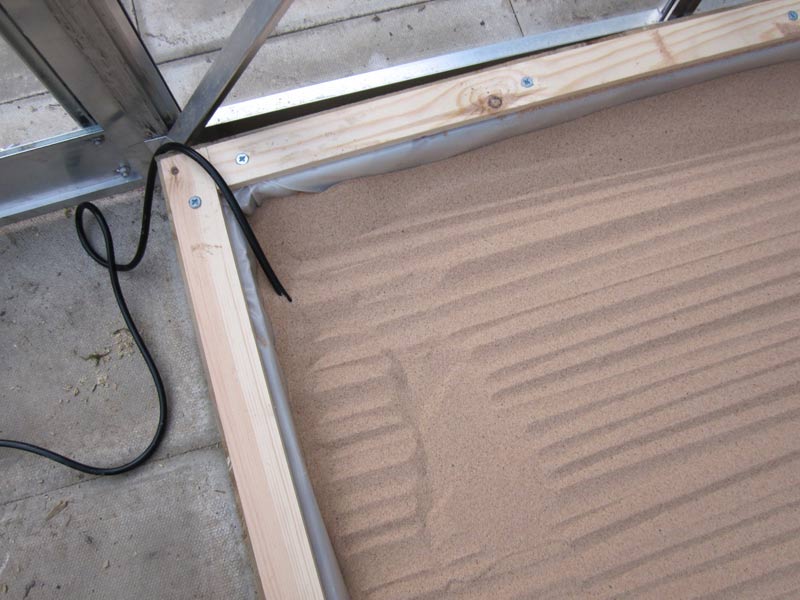
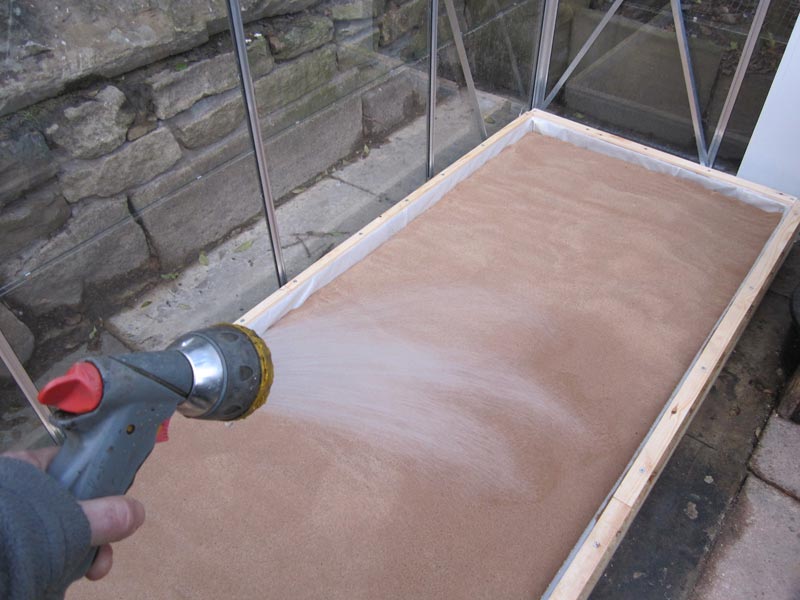
The raw yamadori now has a comfortable resting place to recover and thrive. Now... go and make one for yourself
The whole frame is 12ft x 3ft The Timber was 9”x 2”. There is NO base to the frame, it is laid directly on the stone flags. The Timber is held together with 6” galvanized bolts

A layer of silver backed ‘bubble’ insulation is laid directly on the floor. I could have used 1” Polystyrene block, but this proved OK.


To ensure that the moisture is retained the whole frame is lined with a Heavy Duty Polythene Sheet, and ‘stapled’ into position, particular attention is given to the corners. Holes are cut into the edges to afford drainage as the bed would fill with water and this is not desirable.



Batons are screwed into the top of the frame to secure the Polythene Sheet, galvanised screws are used.

12 bags of Kiln Dried Sand are used to line the base of the frame, 2” deep. This Sand never ‘hardens’ and is a joy to work with. ‘Builders’ sand is not suitable. The Sand is then saturated with water


The heating cable (80ft long) is placed as shown and covered with a further 2” of Sand. The heating cable is unwound and plugged in. This is to 'soften' the cable as it is very stiff when cold.


The completed Heating Bed, the cable is secured to the frame with a cable clip and the whole bed is saturated with water.



The raw yamadori now has a comfortable resting place to recover and thrive. Now... go and make one for yourself

Last edited by Tony on Wed Mar 03, 2010 11:10 pm; edited 1 time in total
Guest- Guest
 Re: How to make your own Heating bed to aid Yamadori survival
Re: How to make your own Heating bed to aid Yamadori survival
That is first class Tony. I would love to have the space to do that.

Smithy- Member
 Re: How to make your own Heating bed to aid Yamadori survival
Re: How to make your own Heating bed to aid Yamadori survival
Thanks Tony.
It is a great solution. 'Like all plants to keep your feet warm and moist. This is a very modern warm beams!
Regards
Mario
It is a great solution. 'Like all plants to keep your feet warm and moist. This is a very modern warm beams!
Regards
Mario

Mario Stefano- Member
 Re: How to make your own Heating bed to aid Yamadori survival
Re: How to make your own Heating bed to aid Yamadori survival
Excellent work Tony. Yours is twice the size of mine!  I used builders polystyrene sheet to line mine, then a thick polythene liner to keep the sand and moisture in.
I used builders polystyrene sheet to line mine, then a thick polythene liner to keep the sand and moisture in.
Be cautious about anything puncturing the liner, as a colleague at our club caused his to overheat when he didn't notice that sand had been washed out and left the cable able to move and touch.
Don't forget that as well as getting better rooting from yamadori, this doubles up as a giant seed propagator, cutting striker and out of season vergetable grower. Keep all of the surface covered and you minimise heat loss and maximise production. I start all my tomatoes, chillis, aubergines, beans etc on mine after any yamadori have gone out in late spring.
Be cautious about anything puncturing the liner, as a colleague at our club caused his to overheat when he didn't notice that sand had been washed out and left the cable able to move and touch.
Don't forget that as well as getting better rooting from yamadori, this doubles up as a giant seed propagator, cutting striker and out of season vergetable grower. Keep all of the surface covered and you minimise heat loss and maximise production. I start all my tomatoes, chillis, aubergines, beans etc on mine after any yamadori have gone out in late spring.

Kev Bailey- Admin
 Re: How to make your own Heating bed to aid Yamadori survival
Re: How to make your own Heating bed to aid Yamadori survival
Hi Tony my friend.
Very useful thing. Super.

Pavel
Very useful thing. Super.


Pavel

Pavel Slovák- Member
 Re: How to make your own Heating bed to aid Yamadori survival
Re: How to make your own Heating bed to aid Yamadori survival
Very interesting Tony. I don't do enough collecting to justify this for yamadori but something like this might be needed for me to survive the chilling down of our area. My collection can't survive another cold winter like I had this year without some energy added protection. Buttonwoods would love this.
Did you add a thermometer to the sand and to the air to monitor temperature? Do you know how many KWhrs this will use per month?
Did you add a thermometer to the sand and to the air to monitor temperature? Do you know how many KWhrs this will use per month?
Last edited by Rob Kempinski on Thu Mar 04, 2010 3:39 pm; edited 1 time in total

Rob Kempinski- Member
 Re: How to make your own Heating bed to aid Yamadori survival
Re: How to make your own Heating bed to aid Yamadori survival
Tony,
great article.
 Peter
Peter
great article.
 Peter
Peter
landerloos- Member
 Re: How to make your own Heating bed to aid Yamadori survival
Re: How to make your own Heating bed to aid Yamadori survival
Looks great I'm not sure if you can get it there but you might look at mason sand as apposed to kiln dried should be cheaper and should work.
flor1- Member
 Re: How to make your own Heating bed to aid Yamadori survival
Re: How to make your own Heating bed to aid Yamadori survival
Hi Rob, the power used is equivalent to a 150KW light bulb, I have it on permanently. I have never used a thermostat relying on regularly checking the bed, at least three times a day.
Flor1. I looked at a few 'sands' and there were cheaper but they were not bagged. You had to purchase 'bulk'
the next phase of the heating bed is to install an automatic misting system that will keep the trees damp and humid.... humid muuuuum
Kev. I have made slits in the liner because I do not want the bed to flood, this happened with my first bed a few years back.
Flor1. I looked at a few 'sands' and there were cheaper but they were not bagged. You had to purchase 'bulk'
the next phase of the heating bed is to install an automatic misting system that will keep the trees damp and humid.... humid muuuuum

Kev. I have made slits in the liner because I do not want the bed to flood, this happened with my first bed a few years back.
Guest- Guest
 Re: How to make your own Heating bed to aid Yamadori survival
Re: How to make your own Heating bed to aid Yamadori survival
I think Tony meant a 150 watt light bulb.  If not, I'd hate for Caroline to see the bill!
If not, I'd hate for Caroline to see the bill!
Mine is on a thermostat which has a long probe into the sand. It works very well and keep the temperature nice and even.
Mine is on a thermostat which has a long probe into the sand. It works very well and keep the temperature nice and even.

Kev Bailey- Admin
 Re: How to make your own Heating bed to aid Yamadori survival
Re: How to make your own Heating bed to aid Yamadori survival
Kev Bailey wrote:I think Tony meant a 150 watt light bulb.If not, I'd hate for Caroline to see the bill!.
Yes that sounds right. 150,000 watts would cook the trees.

Rob Kempinski- Member
 Re: How to make your own Heating bed to aid Yamadori survival
Re: How to make your own Heating bed to aid Yamadori survival
How hot does the sand get?
With my experience with liquids and heaters, the heat shouldn't reach the bottom through the sand. This seems like it would make a nice setup for my tropicals in the basement during the winter. I have a 2 ft x 8 foot table in the basement.
I would also expect, that you could increase the amount of cable in a specific area to raise the temperature, compared to zones that don't need as much heat.
Great set up, thanks!
With my experience with liquids and heaters, the heat shouldn't reach the bottom through the sand. This seems like it would make a nice setup for my tropicals in the basement during the winter. I have a 2 ft x 8 foot table in the basement.
I would also expect, that you could increase the amount of cable in a specific area to raise the temperature, compared to zones that don't need as much heat.
Great set up, thanks!

Jay Gaydosh- Member
 Re: How to make your own Heating bed to aid Yamadori survival
Re: How to make your own Heating bed to aid Yamadori survival
With a thermostat, you can set it at whatever temperature you desire. Mine stays at 65F 18C though I push it up to 70F 21C for germinating some seeds and rooting some cuttings.
I'd love to add a mist propagator for hard to root things. Mebbe when my lottery ticket comes up!
I'd love to add a mist propagator for hard to root things. Mebbe when my lottery ticket comes up!

Kev Bailey- Admin
 Re: How to make your own Heating bed to aid Yamadori survival
Re: How to make your own Heating bed to aid Yamadori survival
Nice work, Tony. I particularly like the 'action shot' of you watering in the sand! Spielberg, my arse!

Harleyrider- Member
 Re: How to make your own Heating bed to aid Yamadori survival
Re: How to make your own Heating bed to aid Yamadori survival
Sorry to reignite an older thread but i'am finally going to get round to building one of these in the new year. I've had the sand and cable sitting since Tony first posted this thread but have'nt had the time 
I do have some questions regarding the bed once in operation and hope someone can answer these "what might seem niave questions" so here goes:
1. Is there a specific temperature which is optimum for newly collected trees?
2. Also given that the plants substrate is warmer it will dry quicker. I guess i'am asking here how often do you water at a specific temperature and know when to water?
3. Can the bed be used to keep a trees rootball from freezing in minus temps without sending the tree into an early Spring? My thinking is that material could be collected all winter without the fear of the rootball freezing?
I'm sure Ive other questions rattling about in here somewhere but thats all I can think of for know?
 in advance
in advance
I do have some questions regarding the bed once in operation and hope someone can answer these "what might seem niave questions" so here goes:
1. Is there a specific temperature which is optimum for newly collected trees?
2. Also given that the plants substrate is warmer it will dry quicker. I guess i'am asking here how often do you water at a specific temperature and know when to water?
3. Can the bed be used to keep a trees rootball from freezing in minus temps without sending the tree into an early Spring? My thinking is that material could be collected all winter without the fear of the rootball freezing?

I'm sure Ive other questions rattling about in here somewhere but thats all I can think of for know?
Marko- Member
 Re: How to make your own Heating bed to aid Yamadori survival
Re: How to make your own Heating bed to aid Yamadori survival
Dear Tony
This is a really good solution.
Kind regards Yvonne
This is a really good solution.
Kind regards Yvonne
Guest- Guest
 Re: How to make your own Heating bed to aid Yamadori survival
Re: How to make your own Heating bed to aid Yamadori survival
Sorry to reignite an older thread but i'am finally going to get round to building one of these in the new year. I've had the sand and cable sitting since Tony first posted this thread but have'nt had the time
I do have some questions regarding the bed once in operation and hope someone can answer these "what might seem niave questions" so here goes:
1. Is there a specific temperature which is optimum for newly collected trees?
2. Also given that the plants substrate is warmer it will dry quicker. I guess i'am asking here how often do you water at a specific temperature and know when to water?
3. Can the bed be used to keep a trees rootball from freezing in minus temps without sending the tree into an early Spring? My thinking is that material could be collected all winter without the fear of the rootball freezing?
I'm sure Ive other questions rattling about in here somewhere but thats all I can think of for know

I do have some questions regarding the bed once in operation and hope someone can answer these "what might seem niave questions" so here goes:
1. Is there a specific temperature which is optimum for newly collected trees?
2. Also given that the plants substrate is warmer it will dry quicker. I guess i'am asking here how often do you water at a specific temperature and know when to water?
3. Can the bed be used to keep a trees rootball from freezing in minus temps without sending the tree into an early Spring? My thinking is that material could be collected all winter without the fear of the rootball freezing?
I'm sure Ive other questions rattling about in here somewhere but thats all I can think of for know
Marko- Member
 Re: How to make your own Heating bed to aid Yamadori survival
Re: How to make your own Heating bed to aid Yamadori survival
1. Is there a specific temperature which is optimum for newly collected trees? I do not use a temp gauge , however the bed maintains an even temperature of around 7ºc
2. Also given that the plants substrate is warmer it will dry quicker. I guess i'am asking here how often do you water at a specific temperature and know when to water? In the depth of winter I check twice a day and water manually, from March till October an Automatic misting system 2 minutes 4 times a day
3. Can the bed be used to keep a trees rootball from freezing in minus temps without sending the tree into an early Spring? My thinking is that material could be collected all winter without the fear of the rootball freezing? this what I use the bed for, however I collect mostly march till may.
Hope this helps
2. Also given that the plants substrate is warmer it will dry quicker. I guess i'am asking here how often do you water at a specific temperature and know when to water? In the depth of winter I check twice a day and water manually, from March till October an Automatic misting system 2 minutes 4 times a day
3. Can the bed be used to keep a trees rootball from freezing in minus temps without sending the tree into an early Spring? My thinking is that material could be collected all winter without the fear of the rootball freezing? this what I use the bed for, however I collect mostly march till may.
Hope this helps
Guest- Guest
 Re: How to make your own Heating bed to aid Yamadori survival
Re: How to make your own Heating bed to aid Yamadori survival
Great stuff Tony, thats much appreciated, thankyou!




Marko- Member
 Re: How to make your own Heating bed to aid Yamadori survival
Re: How to make your own Heating bed to aid Yamadori survival
tony wrote:1. Is there a specific temperature which is optimum for newly collected trees? I do not use a temp gauge , however the bed maintains an even temperature of around 7ºc
[
Only 7 degrees C??
I would assume that you need a higher temperature for the fine roots to grow on yamadori, around 18 degrees C.
stavros- Member
 cost
cost
For such a big bed, bagged sand would be extremely expensive. Can the builders sand that can be bought buy the truck load be used?

bucknbonsai- Member
 Re: How to make your own Heating bed to aid Yamadori survival
Re: How to make your own Heating bed to aid Yamadori survival
Hello Tomy. Has this system greatly improved your survival rate?
Guest- Guest
 Re: How to make your own Heating bed to aid Yamadori survival
Re: How to make your own Heating bed to aid Yamadori survival
Stavros... this is England the land of Wet and Cold, Cyprus = Dry and warm, your trees are different. 7c is enough to get the roots moving, plus I do not want to force or stress the tree once collected, its a fine balance between life and death.
Will. SUBSTANTIALLY
Will. SUBSTANTIALLY

Guest- Guest
 Re: How to make your own Heating bed to aid Yamadori survival
Re: How to make your own Heating bed to aid Yamadori survival
bucknbonsai wrote:For such a big bed, bagged sand would be extremely expensive. Can the builders sand that can be bought buy the truck load be used?
Hi Buck, the sand was £45 in total... expensive for sand yes... but it does not go 'solid'
Guest- Guest
 Re: How to make your own Heating bed to aid Yamadori survival
Re: How to make your own Heating bed to aid Yamadori survival
tony wrote:Stavros... this is England the land of Wet and Cold, Cyprus = Dry and warm, your trees are different. 7c is enough to get the roots moving, plus I do not want to force or stress the tree once collected, its a fine balance between life and death.
Will. SUBSTANTIALLY
Well, if you think about it, especially up the north of England, 7 degrees C is fine
stavros- Member
 Similar topics
Similar topics» How to make the perfect yamadori Root hook
» What's the name or species for this type of plant (pine )?
» Long term Prunus survival problems.
» Heating Mats for bonsai plants?
» grow bed tips and techniques
» What's the name or species for this type of plant (pine )?
» Long term Prunus survival problems.
» Heating Mats for bonsai plants?
» grow bed tips and techniques
Page 1 of 1
Permissions in this forum:
You cannot reply to topics in this forum






